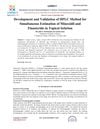 February 2024 in “Brazilian Journal of Implantology and Health Sciences”
February 2024 in “Brazilian Journal of Implantology and Health Sciences” PCOS often causes skin issues like excess hair, acne, and hair loss, needing early treatment.
 February 2024 in “Frontiers in physics”
February 2024 in “Frontiers in physics” The new model detects hair clusters more accurately and efficiently, helping with early hair loss treatment and diagnosis.
 February 2024 in “Bangladesh pharmaceutical journal”
February 2024 in “Bangladesh pharmaceutical journal” The conclusion is that the tested yogurts from Bangladesh are rich in vitamins thiamine and riboflavin, and the testing method is reliable.
 February 2024 in “medRxiv (Cold Spring Harbor Laboratory)”
February 2024 in “medRxiv (Cold Spring Harbor Laboratory)” The study aims to understand how mood, physical activity, light exposure, and seasonal changes affect sleep patterns.
 January 2024 in “Frontiers in endocrinology”
January 2024 in “Frontiers in endocrinology” The study suggests that hypothyroidism may cause alopecia areata.
 January 2024 in “Journal of neurogastroenterology and motility”
January 2024 in “Journal of neurogastroenterology and motility” Quadruple-coated probiotics significantly improve IBS symptoms.
 December 2023 in “Research in pharmacy”
December 2023 in “Research in pharmacy” Phytotherapeutic compounds and supplements can help manage Polycystic Ovarian Syndrome (PCOS).
 December 2023 in “International Journal of Advanced Research in Science, Communication and Technology”
December 2023 in “International Journal of Advanced Research in Science, Communication and Technology” A reliable method was created to measure Minoxidil and Finasteride in a solution.

Plasma gel and PRP treatments improve skin and hair with minimal side effects.
 December 2023 in “Revista Urología Colombiana / Colombian Urology Journal”
December 2023 in “Revista Urología Colombiana / Colombian Urology Journal” More research is needed to find effective treatments for sickle cell disease-related priapism.
 December 2023 in “Research Square (Research Square)”
December 2023 in “Research Square (Research Square)” People with Down syndrome have higher rates of certain immune-related conditions and need special medical attention.
 December 2023 in “Journal of the Endocrine Society”
December 2023 in “Journal of the Endocrine Society” Blocking glucocorticoid receptors improves glucose metabolism in a PCOS mouse model.

Kalya Research is an AI tool that effectively finds and analyzes alternative medicine literature, saving researchers time.
 November 2023 in “Deleted Journal”
November 2023 in “Deleted Journal” Multimedia education greatly improves women's knowledge and management of PCOS.
 October 2023 in “The Journal of clinical endocrinology and metabolism/Journal of clinical endocrinology & metabolism”
October 2023 in “The Journal of clinical endocrinology and metabolism/Journal of clinical endocrinology & metabolism” Hyperandrogenism increases heart disease risk in premenopausal women, but this risk is linked to obesity in postmenopausal women.
 October 2023 in “Frontiers in medicine”
October 2023 in “Frontiers in medicine” Comprehensive screening for infections is crucial before starting JAK inhibitors in alopecia areata patients.
 October 2023 in “Clinical medicine and medical research”
October 2023 in “Clinical medicine and medical research” Thyroid function may influence hair loss after COVID-19.
 September 2023 in “Journal of Rawalpindi Medical College/Journal Rawalpindi Medical College”
September 2023 in “Journal of Rawalpindi Medical College/Journal Rawalpindi Medical College” Birth control pills with cyproterone acetate and drosperinone can reduce excessive hair growth in women with PCOS, but they may not be right for everyone.
 September 2023 in “Clinical, cosmetic and investigational dermatology”
September 2023 in “Clinical, cosmetic and investigational dermatology” SLFC can improve scalp health and reduce sensitive scalp symptoms.
 April 2023 in “Research Square (Research Square)”
April 2023 in “Research Square (Research Square)” Lower GPX4 mRNA levels are linked to higher disease activity and symptoms in lupus patients.
 January 2023 in “Sibirskij medicinskij vestnik”
January 2023 in “Sibirskij medicinskij vestnik” Women with PCOS are more vulnerable to severe COVID-19 and related health issues.

Social media data can help track and predict COVID-19 symptoms and trends.
 October 2022 in “Journal of experimental and clinical medicine”
October 2022 in “Journal of experimental and clinical medicine” Repurposing existing drugs for COVID-19 shows promise but requires more research to confirm effectiveness.
 October 2022 in “Gadua Journal of Pure and Allied Science”
October 2022 in “Gadua Journal of Pure and Allied Science” Terbinafine is the most effective treatment for tinea capitis, a scalp infection often confused with other conditions.
 July 2022 in “International Journal of Health Sciences (IJHS) (En línea)”
July 2022 in “International Journal of Health Sciences (IJHS) (En línea)” Men with Type 2 Diabetes have lower DHT levels, which may affect fertility and lipid profiles.
 December 2021 in “International Journal of Biomedicine”
December 2021 in “International Journal of Biomedicine” Hyperprolactinemia should be treated before confirming a PCOS diagnosis.
 September 2021 in “Selçuk Üniversitesi Tıp Fakültesi dergisi”
September 2021 in “Selçuk Üniversitesi Tıp Fakültesi dergisi” People with chronic Hepatitis C often have skin problems like itching and contact dermatitis, especially older individuals and women.
 December 2020 in “bioRxiv (Cold Spring Harbor Laboratory)”
December 2020 in “bioRxiv (Cold Spring Harbor Laboratory)” Stress can cause a type of hair loss in mice lacking the CCHCR1 gene.

A TNFAIP3 gene mutation can cause unusual and varied symptoms of lupus and Sjogren's syndrome.

A high-fat diet caused severe health problems in female macaques but was reversible with a normal diet, while male macaques reacted differently.






























